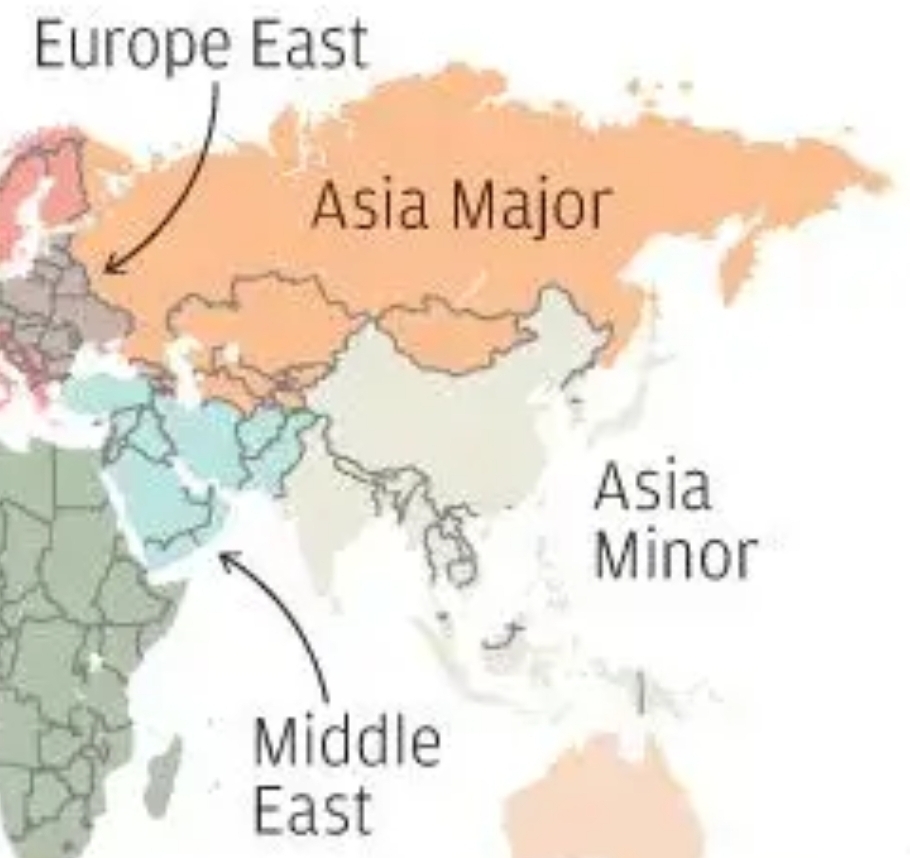These kinds of popsci graphs are quite misleading. Unlike with the “Spanish”* bubble, the “Chinese” and “Arabic” bubbles contain many mutually unintelligible languages. Though to be fair, many (most?) of the people in the “Arabic” bubble can speak/read Modern Standard Arabic as a lingua franca, and virtually everyone in China can read Standard Chinese.
*Also, Dude, Spanish is not the preferred nomenclature. Castilian, please.
You seem like somebody who might have an answer for me:
A streaming service that I’m using lists the spoken language of the show, and I’ve often seen Spanish, Espanol, and Castilian listed. What’s the difference between Espanol and Castilian - is it like a regional dialect? Also I’m probably misinformed, but I always thought that Espanol was the English word for Spanish, which makes it seem odd that the service would list both Espanol and Spanish separately.
* Walter, this isn’t a guy who wrote the Magna Carta, this is a guy…
If there are two Spanishish audio tracks, I think that pretty much always means that one is “Latin American” and the other is “Peninsular.” I haven’t investigated this myself, but I hear that the “Latin American” track is predominantly a white collar Central Mexican accent. The standard Peninsular accent for media is a Madrid accent.
This is pretty spot on. I use español when comparing Spanish to another foreign language but castellano when talking about the language as a whole. The latter is the most popular in Spain because español is also the nationality and we also can speak catalán, vasco, valenciano, gallego, and others
From what I’ve been told they call it castellano in Argentina too, but I have no idea why.
No ho diguis als valencians que ells parlen català occidental 😛
Castilian ia a region of Spain where the “Spanish” language comes from. But there is not the only language there, and there was repression against the other languages there, specially the basque language.
So, call that language Castilian ia also recognize that other languages exists within the country.
(I’m not spanish nor a speaker, so, I may be wrong)
there was repression against the other languages there, specially the basque language.
There was for 40 years, in Franco’s mid-20th century fascist Spain.
Spanish is not the preferred nomenclature. Castilian, please.
???
I know there’s a divide in that some countries say “Español” and others “Castellano” but I don’t think it’s a particularly controversial difference.
Aaaaaah “Chinese”.
A language family with many mutually unintelligible languages, large variantions in vocabulary and a script that us shared by all of them. And somehow we have to keep treating it as one language, so Winnie the Pooh isnt angry at us.
Yeah. It’s not like I can communicate with someone in Cantonese when they only know Mandarin.
If the same script is considered Chinese, might as well put Japanese Kanji inside.
I can’t even understand most Cantonese speakers when they’re speaking Mandarin…
Well I can’t even understand my Mandarin when I speak it
I’d like to point out that the dialect-language-family distinction is really a continuum. As dialects drift apart from each other, there is no point where God comes in and declares a dialect has graduated into its own language. Mutual intelligibility simply decreases continuously.
For instance, Portuguese and Spanish are widely considered to be different languages, although they are partially mutually intelligible, particularly in written form. Cantonese and Mandarin are less so, but still a bit. My uncle-in-law speaks Canto but can still understand my Mandarin (however, he can’t respond). I won’t deny that there is a political reason to want to refer to the Chinese/中文 languages as a single “language,” but the classification is honestly quite arbitrary. My understanding is that linguists generally place the category of “Chinese” somewhere between “language” and “family.”
Is Scots a different language than English? I don’t think I could understand someone speaking Scots without incredible concentration. (However, it’s still considered a “linguistic variety” of middle english.)
I am currently doimg course on both of these topics.
Yes, there is a continuum between these concepts, but there is a much better case for the idea that all ibero-romance languages are actually one language than for the “Chinese Macrolanguage”.
Hakka for example is not mutually intelligible with any of the other branches of the family, yet it is still considered to be a dialect of Chinese. Why? Because it shares the script?
The political reason, imho, far outweigh the linguistical reasons for considering Chinese to be a language rather than a family.
What happened to the French speaking African countries?
Also Angola absent from the Portuguese group
And Austria is missing from the German numbers.
The numbers for Germany and Switzerland seem low. CH has 8M inhabs and more than a third are German speakers. DE has 84M inhabs and even 30% of immigrant families speak exclusively German at home.
So I would guess more like 77M + 7M + 4M
The reason why English, French and Spanish are among the world’s most widespread languages has its roots in the imperial past of the nations where they originate
Must be a hot day in Hong Kong for them to be throwing shade like that. It’s true of course but it’s true for all of the biggest languages that conquest played a significant part in their dispersal. Chinese, Arabic, etc are left out of the statement for some reason.
10 million native Urdu speakers in Pakistan? there’s 11 million in Lahore alone and I’ve never met someone there who doesn’t speak Urdu
German language is missing Austria
Why are Russia, Central Asia, Mongolia, and the Caucasus “Asia Major”, and East Asia and South Asia “Asia Minor”? I also think it’s weird they split Eastern and Western Europe since Germany and Bulgaria (EDIT: and Poland(EDIT2: and Belarus Ukraine, and Latvia, but they’re colored orange as if theyre included in “Asia Minor”)) are the only countries I see from the region in the circle. Also Iran, Afghanistan and Pakistan being in the “Middle East” seems weird to me.
And Switzerland/Belgium being put in eastern Europe lol
Where do you see Bulgaria in the circle?
On the left side of Turkish
Ah, I was thinking of Bulgarian and wondering how it could fit in this graph.
That geographical division made as much sense as referring to my foot as little hand.
There is something very wrong with the French part (so I’m assuming with the rest too)
- There are 321M native French speakers, not 75M
- Some of the countries cited are not countries but extra territorial French regions
Another weird consideration is that they total to 7B people. A lot of people have several native languages
Some of the missing are left out languages. E.g. there are ~200 million speakers of turkic languages, but they only cited Turkish with ~71 million. Amd they didn’t include a single Bantu language. There must be more than 300 million Bantu speakers.
It is also kind of weird that they give numbers to the tenth part while using wild estimates. Turkey has 85 million inhabitants and up to 10 million native speakers outside of turkey. There are no official ethnicity numbers from turkey as ethnicity is not registered. Also no one knows how many turkish speakers exactly live outside of turkey. But they give us numbers to the tenth part? The situation will be similar for the other languages.
I don’t think you understood my point. Total should be way higher than global population. They also have very wrong figures and country knowledge
I was actually just adding more criticism. They obviously negated that people can have more than one native language. There is a lot to criticize on that presentation. I’d file it under “Data can be ugly” tbh.
On the other hand, doing this “cleanly” is near impossible. The language situation is way to complicated to present “the demographic of languages of the world” in a single graph without oversimplifying and misrepresenting stuff.
Oh sorry for misunderstanding
I also agree this is an insanely complex task to do. That’s why I wouldn’t try and release something that false
No Nigeria for English? Lagos is the largest English speaking city in the world.
I don’t think this image accounts for second languages (otherwise Hindi would be twice as big), and as I understand it the reason that English is the official languae of Nigeria even as an independent country is so as not to give anyone’s first language priority over any other
I’ve met a handful of Nigerian students from different parts of the country and they all spoke English as a first language. Also, the US is on there, we don’t have an official language either.
I think you’ve misunderstood me a bit. English is the official language of Nigeria. One of the reasons it’s the official language was that it was seen as neutral within Nigeria because it wasn’t any group’s first language. Or it was at the time, anyway. That was an entire human lifetime ago now, so it’s quite possible that things have changed a bit since then.
It does specify these are first languages/mother tongues. I think English would also be much larger if it included second languages.

TIL China is located in Asia Minor
I think those are old-timey terms that have been retired from academic and popular language. And anyway, Asia Minor means/meant Anatolia—basically modern-day Turkey.
Right, the gibberish they speak in Austria is not German. Oh wait…
Aaw, I thought this vis was really cool until I read every single comment
Does every household in New Guinea speak a different language or wtf is going on there
Almost have as many people speak Tamil as Russian? Interesting!
deleted by creator













